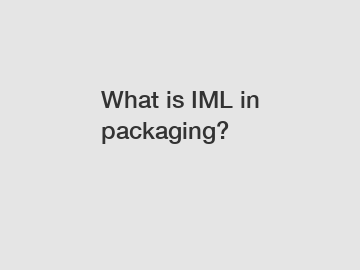What is IML in packaging?
When it comes to packaging technology, one term that is gaining prominence in the industry is in-mold labeling (IML). This innovative process has revolutionized the way products are packaged and labeled, offering a wide range of benefits for manufacturers and consumers alike. In this blog post, we will delve into what IML is, how it works, and why it is becoming the go-to solution for modern packaging needs.
IML is a process that involves placing a pre-printed label into a mold before injecting molten plastic. The label fuses with the plastic during the molding process, resulting in a seamless, durable, and high-quality finished product. This method eliminates the need for secondary labeling processes such as adhesive labels or printing directly onto the packaging, saving time, money, and resources.
One of the key advantages of IML is its ability to create visually stunning packaging designs. The pre-printed labels can feature intricate designs, vibrant colors, and high-resolution graphics that are not possible with traditional labeling methods. This allows manufacturers to differentiate their products on the shelves, attract consumers' attention, and enhance brand recognition.

Furthermore, IML offers superior durability compared to other labeling techniques. The labels are protected within the plastic, making them resistant to scratches, fading, and moisture. This ensures that the packaging maintains its pristine appearance throughout the product's lifecycle, enhancing the overall consumer experience.
In addition to its aesthetic and functional benefits, IML also offers environmental advantages. The process produces minimal waste as the labels and packaging material are fully recyclable. This aligns with the growing demand for sustainable packaging solutions and helps companies reduce their carbon footprint.
From a production standpoint, IML offers increased efficiency and productivity. The labeling and molding processes are combined into a single step, streamlining production lines and reducing labor costs. This results in faster turnaround times, higher output, and improved overall profitability for manufacturers.
IML is suitable for a wide range of industries, including food and beverage, cosmetics, household products, and more. Its versatility allows for the creation of diverse packaging solutions, from rigid containers to flexible pouches, catering to different product requirements and market demands.
Overall, IML is a game-changer in the packaging world, offering unmatched benefits in terms of design flexibility, durability, sustainability, efficiency, and cost-effectiveness. As consumer preferences evolve and competition intensifies, manufacturers are turning to IML to stay ahead of the curve and meet the demands of the market.
In conclusion, IML is more than just a labeling technique; it is a comprehensive packaging solution that combines creativity, functionality, and sustainability in one seamless process. Its ability to enhance product aesthetics, protect labels, reduce waste, and improve production efficiency makes it a must-have technology for companies looking to stand out in today's competitive marketplace.
As the packaging industry continues to evolve, IML will undoubtedly play a crucial role in shaping the future of packaging design and production. Its innovative approach to labeling opens up new possibilities for brands to create visually appealing, durable, and sustainable packaging solutions that resonate with consumers and drive business growth.
In summation, IML is a transformative technology that is revolutionizing the way products are packaged and labeled. Its numerous benefits make it a top choice for manufacturers looking to enhance their packaging designs, streamline production processes, and meet the demands of today's consumers. With its proven track record of success and ongoing advancements in technology, IML is set to be a game-changer in the packaging industry for years to come.
For more information, please visit 15oz IML Plastic margarine tub, 125g Ice Cream Container, Blow Molding IML.

Comments